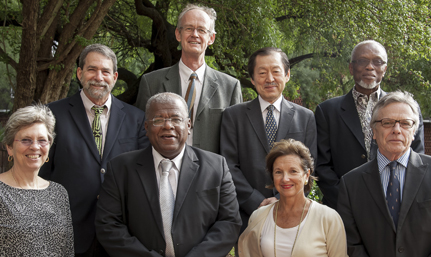Latest News Archive
Please select Category, Year, and then Month to display items
22 May 2020
|
Story Nitha Ramnath
![]()
A Virtual celebration of Africa Month
On 25 May 2020, Africa will celebrate the 57th anniversary of the founding of the Organisation of African Unity. A central tenet of the organisation, which was the predecessor of the African Union, is African solidarity. Member states undertook to coordinate and intensify their cooperation and efforts to achieve a better life for the people of Africa. The University of the Free State (UFS) has a long tradition of commemorating Africa Day and the ideas underpinning it. Every year, diverse events aimed at advancing African unity and solidarity take place during Africa Month – traditionally, the highlight is the Africa Day Memorial Lecture hosted by the University's Centre for Gender and Africa Studies.
This year, celebrating African unity through significant events involving the physical presence of a large number of people, will likely be impossible. COVID-19 is ravaging the world and Africa may become one of the world regions worst affected by the consequences of the virus. Social distancing may be difficult to achieve in a continent with densely populated urban centres that often feature large informal settlements. Besides, the economies of African nations are not as robust as those of other world regions. The challenge that Africa is facing, appears to be one that can only be mastered by its people acting in solidarity and unity. The continent has already developed an Africa Joint Continental Strategy for COVID-19 Outbreak to combat the virus, and an Africa Taskforce for Coronavirus has been established. The ideas of African togetherness and the underpinning philosophy of Ubuntu may be critical for strengthening African solidarity at a time when it may be more relevant than ever.
The commemoration of Africa Day takes a different theme each year. This year, the UFS 2020 Africa Month celebrations will take a virtual format, with the theme of ‘Africa together forever’ underpinned by the COVID-19 global pandemic. The theme is particularly significant considering the context of the African continent; and only through the demonstration of solidarity and unity can Africa overcome the challenges of the global pandemic.
The University will host a variety of cultural and intellectual contributions on the dedicated UFS virtual Africa Month website. On Africa Day (25 May 2020), a virtual Africa Day function, which will be posted on the website, will conclude the Africa Month commemorations.
The diverse contributions to the 2020 virtual Africa Month activities will highlight the University’s commitment towards creating a diverse, challenging intellectual environment. The UFS strives as a research-led university, to provide an environment in which new ideas are incubated and debated; contributing towards its transformation process and African unity.
Esteemed international Council advises the UFS
2013-03-26
|
 |
|
In front, from the left are: Prof Alice Pell, Vice-Provost for International Relations, Cornell University in the USA; Prof Jonathan Jansen, Vice-Chancellor and Rector of the UFS; Ms Jane Evans, Director of Ntataise Early Child Development Network Support Programme in South Africa; Mr Gert Grobler, Ambassador of South Africa to Madagascar and alumnus of the UFS. At the back, from the left are: Prof Joel Samoff, Professor in African Studies, Stanford University in the USA; Prof Teuns Verschoor, Vice-Rector: Institutional Affairs of the UFS; Prof Masafumi Nagao, Project Professor at the Graduate School for Frontier Sciences, University of Tokyo; and Prof Akilagpa Sawyerr, former Secretary General of the Association of African Universities (AAU), Ghana. Ms Phumzile Mlambo-Ngcuka, former Deputy President of South Africa, was absent when the photo was taken.
Photo: Sonia Small
27 March 2013 |
The International Advisory Council (IAC) of the University of the Free State (UFS) is visiting the Bloemfontein and Qwaqwa Campuses this week as part of its biennial meeting with the university leadership. The Council, consisting of seven leading academics, business leaders and policy makers, are advising the leadership on how well we perform against international benchmarks in research, teaching, service and transformation. The Council also acts as advocates for the university in their own spheres of influence.